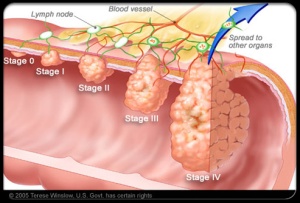COLON CANCER
The human colon is a muscular, tube-shaped organ measuring about 4 feet long. It extends from the end of your small bowel to your anus, twisting and turning through your abdomen (belly). The colon has 3 main functions.
- To digest and absorb nutrients from food
- To concentrate fecal material by absorbing fluid (and electrolytes) from it
- To store and control evacuation of fecal material
- The right side of your colon plays a major role in absorbing water and electrolytes, while the left side is responsible for storage and evacuation of stool.
Cancer is the transformation of normal cells. The transformed cells grow and multiply abnormally.
- Left untreated, these cancers grow and eventually spread through the colon wall to involve the adjacent lymph nodes and organs. Ultimately, they spread to distant organs such as the liver, lungs, brain, and bones.
- Cancers are dangerous because of their unbridled growth. They overwhelm healthy cells, tissues, and organs by taking their oxygen, nutrients, and space.
- Most colon cancers are adenocarcinomas-tumors that develop from the glands lining the colon’s inner wall.
- These tumors are sometimes referred to as colorectal cancer, reflecting the fact that the rectum, the end portion of the colon, can also be affected.
In the United States, 1 in 17 people will develop colorectal cancer.
- According to reports from the National Cancer Institute, colorectal cancer is the third most common cancer in US men.
- Colorectal canceris the second most common cancer in US women of Hispanic, American Indian/Alaska Native, or Asian/Pacific Islander ancestry, and the third most common cancer in white and African American women.
- The overall incidence of colorectal cancer increased until 1985 and then began decreasing at an average rate of 1.6% per year.
- Deaths from colorectal cancer rank third after lung and prostate cancer for men and third after lung and breast cancer for women.
Colon cancer is the third most frequently diagnosed cancer in men and women and the second highest cause of cancer deaths in the U.S. Yet, when found early, it is highly curable. This type of cancer occurs when abnormal cells grow in the lining of the large intestine (colon) or rectum. Learn more about who gets colorectal cancer, how it is detected, and what the latest treatments can accomplish.
Colorectal Cancer: How It Starts
Colorectal cancers often begin as polyps – benign growths on the interior surface of the colon. The two most common types of intestinal polyps are adenomas and hyperplastic polyps. They develop when there are errors in the way cells grow and repair the lining of the colon. Most polyps remain benign, but some have the potential to turn cancerous. Removing them early prevents colorectal cancer.
What is COLON CLEANSING? Simply put, it is the process of cleaning the intestinal tract and the colon for removing the toxins. Some of the methods used for the colon cleansing are injecting water, dietary supplement, laxatives, and herbs. People resort to colon cleansing mainly because any accumulation of the toxins in the intestinal tract will lead to various diseases.
Beginning of colon cleansing: It is believed that the ancient Egyptians thought that the toxins accumulated in the intestine and started causing fever and pus. Their theory was further supported by the microbiological studies conducted in the 19th century. In the course of time, scientists came up with the suggestions that since the body cannot fully remove the wastes and toxins on its own, colon cleansing was advised.
When it is advised and symptoms:Colon cleansing is done prior to any surgery, procedures, or colonoscopy. A regimen of liquid
 is administered on the previous day to the surgery, thus the colon and the intestinal tract is cleaned of any accumulation. The toxins can cause weight gain, headache, fatigue and low energy levels.
is administered on the previous day to the surgery, thus the colon and the intestinal tract is cleaned of any accumulation. The toxins can cause weight gain, headache, fatigue and low energy levels.
How is it done: Colon cleansing can be done in two methods, one by using oral supplements and the other by getting it done with the help of a physician. The oral supplements can be purchased in pharmacies, health food stores or independent health distributors and the list of supplements include herbal supplements, laxatives, herbal teas, enemas, and anti-parasite capsules.
 Colon irrigation: Colon irrigation is better than enema in that it does not give any discomfort to the person. Plenty of water is pushed into the colon and the remains are pushed out. The physician may also use probiotics which have beneficial bacteria in them.
Colon irrigation: Colon irrigation is better than enema in that it does not give any discomfort to the person. Plenty of water is pushed into the colon and the remains are pushed out. The physician may also use probiotics which have beneficial bacteria in them.
Benefits of colon cleansing: Since toxins are removed in the process of colon cleansing, the advantages are manifold. The person who undergoes this will get a better mental outlook, lose unwanted weight, and improved immune system, and he also has less risk of colon cancer.
Is colon cleansing necessary: There are also arguments that the natural bacteria present in the colon helps in removing the toxins and the liver also helps in neutralizing them. It is said that the colon with the help of the mucus membranes, prevents any unwanted toxins from entering the blood or tissues. Since the old cells of the colon are removed very often, the chances of harmful bacteria adhering to the colon walls are very remote. It is also argued that the body absorbs most of the calories even before they reach the intestinal tract and so weight loss cannot be attributed to this reason.
Side effects: Colon cleansing does have some side effects which include nausea, vomiting, and cramps. The person may also feel dizzy and dehydrated. There are also chances of infection in the area. If a person has Crohn’s disease, hemorrhoids, diverticulitis, or any bowel surgery has been performed on him. Persons with heart or kidney diseases also should not undergo colon cleansing.
 Achieving colon health: The food you take has the maximum impact on the health of the colon. It will reduce the risk of colon cancer greatly and boost the general health. Diet with more fiber will reduce colon problems such as constipation, and diverticulitis. Intake of more cereals, whole grains, and fiber which are present in fruits, vegetables, and oatmeal, apart from lot of fluids will enhance the health of colon. Tobacco and red meat should be reduced.
Achieving colon health: The food you take has the maximum impact on the health of the colon. It will reduce the risk of colon cancer greatly and boost the general health. Diet with more fiber will reduce colon problems such as constipation, and diverticulitis. Intake of more cereals, whole grains, and fiber which are present in fruits, vegetables, and oatmeal, apart from lot of fluids will enhance the health of colon. Tobacco and red meat should be reduced.
Posted on 05/22/2013, in HEALTH. Bookmark the permalink. Leave a comment.






















Leave a comment
Comments 0